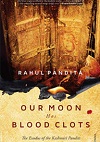“Justice will not be served until those who are unaffected are outraged as those who are.” ~Benjamin Franklin
Journalist Rahul Pandita’s book “Our Moon has Blood Clots” makes you angry about the plight of Kashmiri Pandits, refugees in their own homeland. As eminent historian Ramachandra Guha says, “This book throws new light on one of the most tragic conflicts in the modern world. Every paragraph of this compelling memoir rings true”.
Pandita’s book exposes the hypocrisy of a ‘secular’ democracy, its intellectual class, its candle light brigade, its bleeding heart activists and, above all, its silent majority. Now 36, Pandita was forced to leave his home town of Srinagar, capital of Kashmir, when he was just 14. That was in 1990. With separatist militancy on the rise, Kashmiri Pandits, who constitute less than five percent of Kashmir’s total population, became homeless in the harsh winter that year.
It has taken 20 years for this story to emerge. The world is being fed stories about the region’s separatist aspirations and the Indian Army’s brutality, but the Pandits’ story had remained untold till now. Kashmiri Pandits, mostly middle-class, educated, hardworking and peaceful community (the only Hindus in Muslim-dominated Kashmir), were driven out of their ancestral homes in less than three months in the early 1990s.
Pandita narrates stories of the brutal genocide orchestrated by Islamist militants in the Kashmir valley. The cruelty of the attacks sometimes brings to mind what happened to the Jews in Europe, the Christians in Armenia, and people of Indian origin under the Ugandan regime of Idi Amin. Pandita’s heart-wrenching personal account shows how opinion makers made no effort to avert the tragedy. Human rights activists, international peace-makers, public intellectuals, politicians, and even journalists from the ‘mainstream’ media went about as if the problem did not exist. Pandita surmises they looked away because talking about the lynching of Kashmiri Pandits might have made them look less ‘secular’.
Pandita’s style is lucid, and he refrains from making his story melodramatic. He does not spare anyone, including the Hindu Right Wing which gains political mileage from raising, every now and then, the question about Hindus in Kashmir. Pandita’s point is that political parties are unwilling to do anything more to help the victims.
The exploitation of displaced Kashmiri Pandits begins at the hands of fellow Hindus the moment they arrive in the neighbouring region of Jammu. They expect to be treated with sympathy and love in the Hindu majority area, but heartless landlords exploit them, and an insensitive population humiliates them.
Pandita is unsparing of Kashmiri Muslims, who remain silent when their Hindu friends and neighbours are being hounded out and butchered. He gives several instances of extreme oppression by Muslim neighbours. In one instance, a 14-year-old boy tells visiting prime minister K Gujral that his family was killed with the active participation of his neighbours, and they should not be allowed to touch the bodies.
The book is filled with stories of families turning against neighbours, friends conniving with persecutors, childhood friends raping and killing hapless Pandit women and even the police joining hands with cold-blooded murderers. Pandita gives the lie to propaganda that the Pandits were forced to flee by Jagmohan, Governor of Jammu and Kashmir during their exodus to bring a bad name to Muslims and launch an attack on the separatists.
Pandita is an eyewitness to many horrors. In the two decades since 95 percent of the Pandit population was driven out of Kashmir, the government has done nothing to heal their wounds and help them return to their homeland.
When the exodus of terrified Pandits was on, CPM leader HKS Surjeet said, without sentiment, “Such things happen”. This reflects the callousness of the Left-liberal intellectual and political class for whom the suffering of Pandits is no suffering at all. Such things happen when the victims don’t constitute a vote bank or don’t subscribe to a particular political ideology.
“Our Moon has Blood Clots” is a bold attempt at countering propaganda with truth. It voices despair about a nation that mouths lofty platitudes but does little to protect its persecuted communities. This is a compelling book that cries for answers.
Our Moon Has Blood Clots: The Exodus of The Kashmiri Pandits by Rahul Pandita (Random House India, 258 pages, 2013)
DP Satish is Senior Editor, CNN-IBN.
This review was originally published by Pragati, here.


